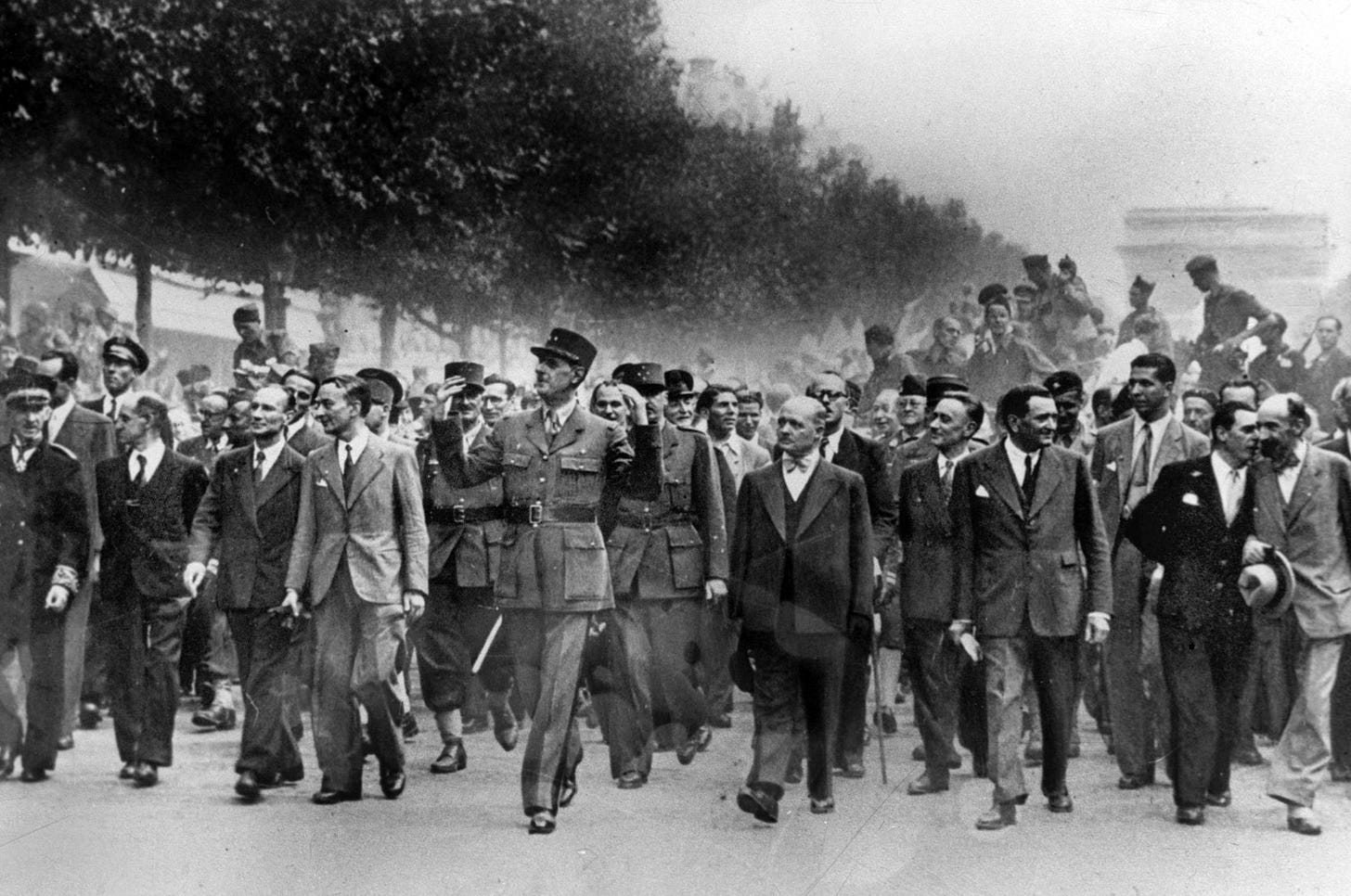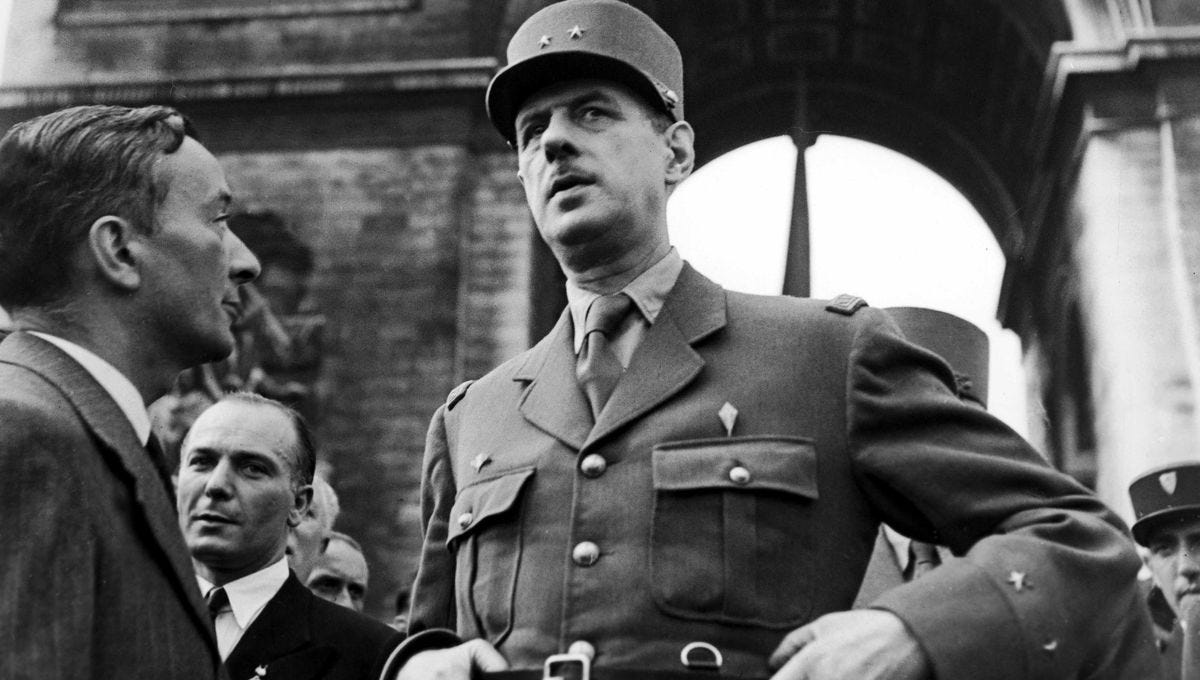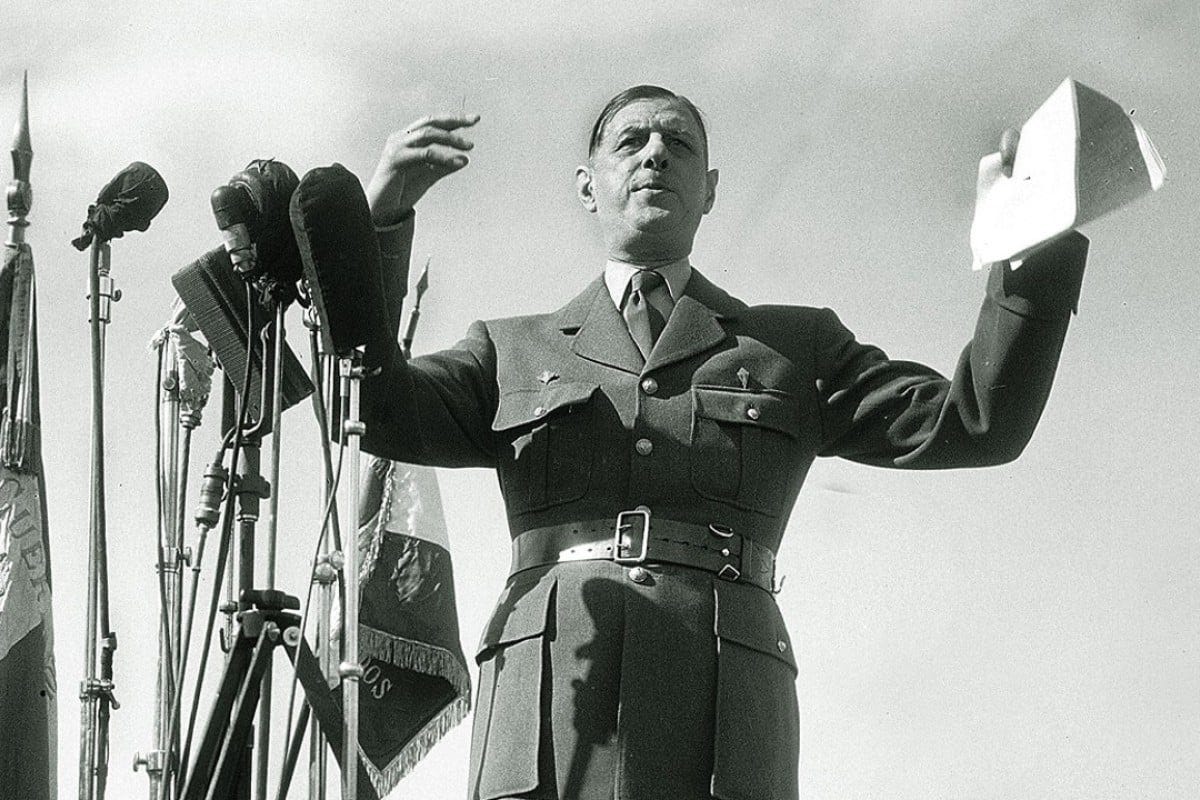In a famous interview, Général de Gaulle declared that he had “a certain idea of France”. A France that not only included that of his present, but that of its past, and especially that of its future. And this “idea of France” required that France be great, that it played a role in the world suitable to its ambitions. And if did not play such a role, then France simply had no justification for its existence.
In that same interview, the journalist Michel Droit pointed out that while de Gaulle had "a certain idea of France”, it was also said that he had “a certain idea of the French”. And this “idea of the French” was much less glorious in his mind.
De Gaulle was often seen this way, as a man embodying a France that rested above its people. Many resented him for this, accusing him of caring little for common issues, and rather focusing only on those which he thought were worthy of his function, of the nation.
Why the French require great goals
Limoges Prefecture, May 20, 1962.
AP: "Why does France need to be great to be herself?"
CDG: "Because the French need to have pride in France. Otherwise, they drag themselves into mediocrity, they argue, they take a shortcut to the bar!"
AP: "But why does France, specifically, struggle so much to stand tall, to live in its time, to modernize? Why is it not satisfied with the rational methods that suffice for others?"
CDG: "If lofty goals are not presented to it, if it doesn't have a sense of its own dignity and nobility, it falls into a sort of lethargy. By breaking free from mediocrity, it possesses great capacities."
On the character of the French, and the Republic
Besançon Prefecture, June 17, 1962.
AP: "Will France always exist?"
CDG: "It's probable, but not certain. If it no longer has the stature of a great power, if it lacks a grand policy, it is nothing. Look at Portugal, it was once great. This tiny nation conquered Brazil, the coasts of Africa, India, and China. The Pope granted them half the world, while assigning the other half to Spain. Today, it is a poor little country.
Will France decline as well? Will it become like Portugal? Can it climb back up? Will it end up sinking? That is the only question. In a thousand years of history, France has experienced highs and lows, it has shown the world that it is a great people, and it has wallowed in its own mire.
What I have been trying to do for a quarter of a century is to assert France's identity on behalf of the French. For now, they follow me. I am not certain that they will always follow the same path and won't prefer to return to the ditch."
AP: "How can it be avoided?"
CDG: "We must trust in their strengths and defend them against their weaknesses. Neither have changed much since Caesar described them. Their strengths are their bravery, their generosity, their selflessness, their impetuosity, their curiosity, their capacity for invention, the gift they have retained to adapt to extreme situations. Their weaknesses are the clans, reciprocal intolerance, their sudden anger, internal strife, and the jealousy they harbor towards the advantages that other French people may acquire."
AP: "A journalist said the other day that you love France but you do not love the French."
CDG: "What is true is that in the face of the greatness of France, I often encounter the smallness of the French. They simmer in their petty quarrels and cook their little soup."
AP: "Yet, it is the French who have made France, after all. Do you love the Republic?"
CDG: "I do not love the Republic for the sake of the Republic, but since the French adhere to it, one must also adhere to it. They cannot imagine living any other way than in a Republic."
On the meaning of greatness
On the plane between Cayenne (French Guiana) and Le Lamentin (Martinique), March 22, 1964.
In front of the ebony faces gathered in Félix-Éboué Square in Cayenne, yesterday the General spoke about "grandeur," which France needs to be true to itself. The day before yesterday, in Basse-Terre, he proclaimed, "Throughout history, our forefathers have only been able to accomplish something valuable and strong by aspiring to greatness."
When the aide-de-camp called me over to him on the plane, I asked:
"You often speak of grandeur, General. What does grandeur mean?"
CDG: "It is the path one takes to surpass oneself."
AP: "So, for France, grandeur..."
CDG: "It is to rise above itself, to escape mediocrity, and to regain the brilliance it had in its best periods."
AP: "In other words?"
CDG: "Radiant."
I did not dare to pursue it further. For himself, naturally, grandeur means surpassing his "poor humanity" by identifying with France. Always, this enigma: why, how, did Charles de Gaulle have the conviction so early on that he would be a hero of our history? France elevates him, and he elevates France. Modesty prevents him from speaking about it, but he knows that he is one of those whose greatness can lead to the greatness of their country. He knows that figureheads are not mere floating buoys that rise and fall with the waves, but rather, they chart new courses on the oceans of destiny. He knows that one man can change the course of fate.
Even in his old age, he continues: constantly facing this persona. Thus, through one of those inadvertent slips that even the most discreet individuals make, I learned yesterday that he carries a burden within him. In his travels, in his public speeches, he endures agony and passion. No one notices. I scrutinize his face for signs of exhaustion: none appear. In the field of Arbaud, in Basse-Terre, the day before yesterday, he shouted at the top of his lungs to an immense crowd in Guadeloupe, "My God! How French you are!"
France as the third international reality
Golden Salon, January 24, 1963.
The General said to me, "You see, we have chosen to base our policy on realities and not appearances. Now, what are the realities? First, America. It is an expanding country that seeks to maintain and confirm its hegemony in the West. The United States emerged as great victors of the war. They believe that they will always succeed in leading the world, as they have done since '45.
They now want to create a 'multilateral force' to camouflage this nuclear hegemony, just as they had already created NATO in 1949 to camouflage their conventional hegemony. The British will be their Trojan horse in Europe. For that, all the European Community needs to do is open itself to the Anglo-Saxon world; and in return, they will rule it. It's an eternal story. Each empire, in turn, claims hegemony. It will be the same until the end of the world.
What is the second international reality? Russia. In practice, it has probably given up on ruling the world and realizes that its time has passed. But it does not want to be devoured, and it is right.
And what is the third international reality? It is France. We are currently the only ones, apart from the Americans and the Russians, who have a national ambition, who stick to it, and who have the courage to say it.
Outside of these three international realities, there are only nebulas, there are only countries divided against themselves, there are only eternal candidates, there are only perpetual hesitators."
[…]
During the Council of Ministers on June 6, 1962, Couve declares, "In the same week, we witnessed the Wall Street crash and a significant crisis in Moscow. The United States and the USSR are both facing difficulties simultaneously."
CDG: "They are two of a kind."
After the Council, the General says to me, "We no longer want the two superpowers defying each other and dragging their frightened sheep behind them! The Fourth Republic was full of incoherence. It had created a foreign policy obedient to the Americans and a colonial policy fought against by them. It alienated Eastern countries because it was subservient to the Americans and the entire world because it claimed to perpetually subordinate our colonies, starting with Algeria. That is not the message France sent to the world. France is not France when it is hated by peoples, especially those who aspire to emancipate themselves."
AP: "The policy of the Fourth Republic had a certain coherence. France dominated numerous peoples. In turn, it was dominated by the Americans. Why couldn't it have been a protectorate itself since it had protectorates?"
The General does not smile. He did not appreciate my interruption. I sense that this paradox annoys him.
CDG: "Well, that subordination is over. What is good for France will not be decided in Washington but in Paris. What is good for Senegal will not be decided in Paris but in Dakar. Each people must take their destiny into their own hands. Otherwise, what happened before I returned to power will occur again.
The Americans encouraged our own vassals to revolt against us while treating us as vassals ourselves. And three out of four French people supported it without a murmur! And one out of four French people was ready to be vassalized by the Soviets! Only independence had no supporters!
But I am wrong to say 'the French.' The French, poor things, didn't think much. They followed like cattle being led to the fair. One faction, the strongest, wants to lead them to huddle under the wing of the Americans; another faction, to huddle under the wing of the Russians. But where is the faction that would lead the people towards the greatness of France?
We experienced this during the time of the Burgundians and the Armagnacs, during the time of the League and the Guise. That's how Athens ended, that's how the Republic of Venice ended. They disintegrated because they lacked patriots. Are we going to disintegrate as well? Fortunately, we have shaken off all that!
The President's vocation is to rally the French people so that they preserve their independence and their identity! It is his first duty! We have begun to help the people escape resignation. It may be their last chance to hold their heads high, to escape enslavement, and to lead other peoples to escape it as well."

On the eternal character of nations
I tell the General what René Brouillet just told me about Austria.
"There is an extraordinary fixity in the two components of the political game: the populists (Christian Socials) and the socialists. These two groups have shown very small, practically negligible variations since 1919. They consistently achieve almost identical scores, differing only by 1%."
The General replies to me: "What is true for parties and their voters is even more true for nations. Nations do not change. They do not die. Well, except in accidents. They remain themselves, with their own characteristics, their collective temperament, their soul. They can live as long as the olive tree. It is true that not all olive trees live for twenty-five centuries like Plato's. There are nations that decline.”
(He gets up and moves a few steps away from his desk. He broadens the topic.)
"Living in society means being oneself, asserting one's personality without infringing upon others. Likewise, international life should allow each nation to assert itself without harming others. Independence is to nations what freedom is to individuals. A nation needs to be proud. It must have the pride to say, 'I am the product of a history that belongs to no other.' When a Spanish or Italian cyclist wins the Tour de France, they are proud not only for themselves but for Spain or Italy. Our role in the world is to encourage nations to be proud of themselves, to increasingly affirm their own distinct personality while respecting that of others. It is our calling. It is our duty."






